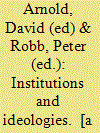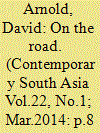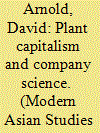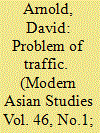|
|
|
Sort Order |
|
|
|
Items / Page
|
|
|
|
|
|
|
| Srl | Item |
| 1 |
ID:
118895


|
|
|
|
|
| Publication |
2012.
|
| Summary/Abstract |
That technology matters-and matters profoundly-to the humanities and social sciences is no longer in dispute. But exactly how it informs our understanding of society, now and in the past, remains a matter of scholarly contention. It might be argued that, as the history and sociology of technology moves away from its principal point of origin in the study of Euro-American societies, the questions that technology poses have, if only by virtue of their relative novelty, a particular resonance for the constituent regions of modern Asia-and not least for the societies of South and Southeast Asia that form the subject of this special issue. It is not a question of adopting an approach as unsubtle and outmoded as technological determinism, or of simply extending to one corner of the Asian landmass a set of 'global' theories and histories, with technology as their underpinning, already established and familiar in other contexts. Rather, it is a case of finding and developing a perspective on technology which helps to illuminate the inner histories and local narratives of these regions and which brings to the wider discussion of technology something distinctive, distilled from the outlook and experience of one part of the non-Western world. A desire to move beyond scholarship's still-dominant paradigms of colonialism, nationalism, and development, to explore the multivalent nature of 'everyday life' and enquire into 'the social life of things' as locally constituted, to examine modernity's diverse material forms, technological manifestations, and ideological configurations, to locate the regional roots as well as the exogenous origins of social change and cultural transformation, to situate subaltern experience alongside middle class mores and elite appropriation-all these interlocking considerations have begun to form part of a collective inquiry into the technological histories and cultures of South and Southeast Asia. A scholarly search is clearly under way to establish new methodologies and meanings, new contexts, and conjunctures, which will inform and reinvigorate the history, sociology, anthropology, and geography of these regions and redefine their place within the burgeoning field of science and technology studies.
|
|
|
|
|
|
|
|
|
|
|
|
|
|
|
|
| 2 |
ID:
049366


|
|
|
|
|
| Publication |
Surrey, Curzon Press, 1993.
|
| Description |
viii, 311p.
|
| Standard Number |
0700702849
|
|
|
|
|
|
|
|
|
|
|
|
Copies: C:1/I:0,R:0,Q:0
Circulation
| Accession# | Call# | Current Location | Status | Policy | Location |
| 044421 | 320.50954/ARN 044421 | Main | On Shelf | General | |
|
|
|
|
| 3 |
ID:
129524


|
|
|
|
|
| Publication |
2014.
|
| Summary/Abstract |
Taking early nineteenth-century European travel narratives as its point of entry, this article suggests ways in which the subject of roads in India can be more fully addressed. Rather than regarding them as purely a means of circulation (of goods, ideas and personnel), roads can be interpreted as a manifestation of linear modes of power and, for Europeans and Indians alike under colonial rule, as a salient site of social observation, engagement and friction. Roads constitute an underappreciated site of social interaction - voluntarily, perhaps, as among pilgrims and other travellers, but also, at the other extreme, through the contrived sociability of individuals' intent on deception and theft. Roads were subject to coercive forms of social interaction as with convicts and famine relief workers obliged to labour on their construction and repair. Roads provided routes to new social locations, but also avenues for political display and ideological intervention and for the articulation of new technologies of social control and state action. Although this article's approach is primarily historical, it suggests ways in which the subject of roads might be of wider interdisciplinary interest and more contemporary significance.
|
|
|
|
|
|
|
|
|
|
|
|
|
|
|
|
| 4 |
ID:
084838


|
|
|
|
|
| Publication |
2008.
|
| Summary/Abstract |
The career of the Danish-born botanist Nathaniel Wallich, superintendent of the Calcutta Botanic Garden from 1815 to 1846, illustrates the complex nature of botanical science under the East India Company and shows how the plant life of South Asia was used as a capital resource both in the service of the Company's economic interests and for Wallich's own professional advancement and international reputation. Rather than seeing him as a pioneer of modern forest conservation or an innovative botanist, Wallich's attachment to the ideology of 'improvement' and the Company's material needs better explain his longevity as superintendent of the Calcutta garden. Although aspects of Wallich's career and botanical works show the importance of circulation between Europe and India, more significant was the hierarchy of knowledge in which indigenous plant lore and illustrative skill were subordinated to Western science and in which colonial science frequently lagged behind that of the metropolis.
|
|
|
|
|
|
|
|
|
|
|
|
|
|
|
|
| 5 |
ID:
118900


|
|
|
|
|
| Publication |
2012.
|
| Summary/Abstract |
In India in the early twentieth century the modern socio-technological phenomenon of traffic brought together many visible and accessible forms of everyday technology. However, in India modern motorized transport had to operate alongside earlier, seemingly 'pre-modern', modes of street-life. The emergence of traffic helped foster the expansion of late-colonial policing and the growth of the 'everyday state'. It stimulated a new sense of a middle class identity and the proper ordering and disciplining of those who used the modern highway. But the technology of traffic was also contested-by those who evaded traffic rules as well as by those who were critical of technological modernity or the rising human cost of traffic accidents. The street at times became a site of open opposition to state authority or, through the deliberate disruption of traffic, a significant location for the exercise of political defiance and control.
|
|
|
|
|
|
|
|
|
|
|
|
|
|
|
|
|
|
|
|
|